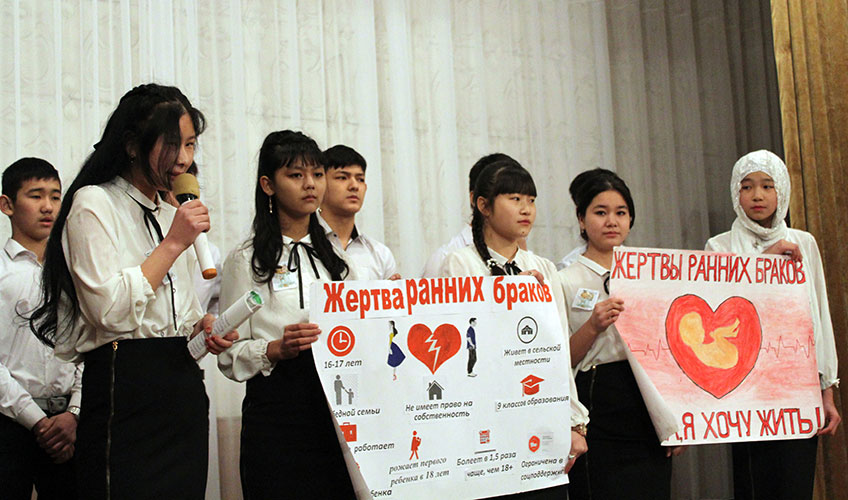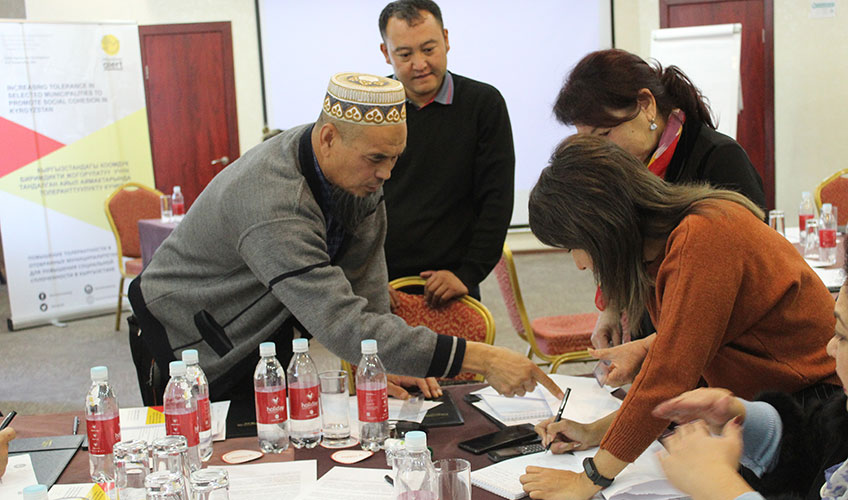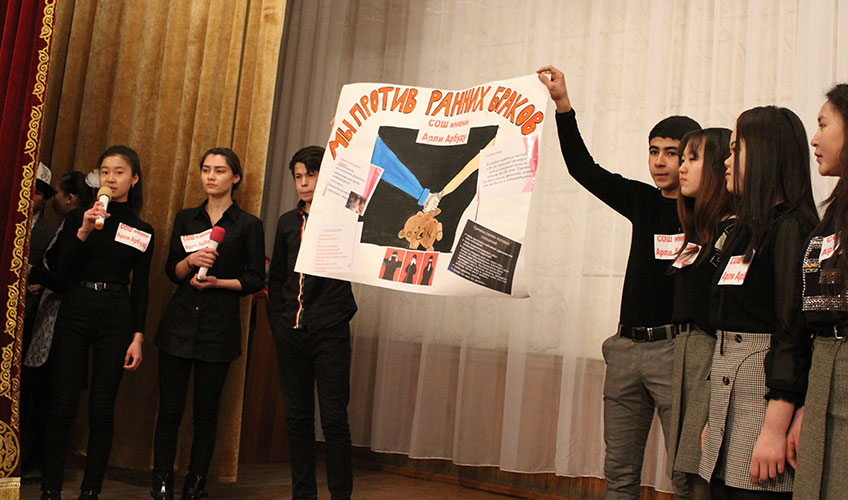Preventing early marriages
According to the research conducted within the framework of International Alert’s ‘Increasing tolerance in selected municipalities to promote social cohesion in Kyrgyzstan’ project, almost 90% of the population is deeply religious, freely performs all religious rites and observes rules of the secular law. In addition, the value of secular education is declining in the community, especially among girls, and restrictions on certain social entertainment events are increasing within the community.

Religious leaders closely cooperate and communicate with local authorities, and the population trusts religious leaders more than local authorities. In Alexandrovka, Kyrgyzstan, there is a Council of elders, which includes women, and whose decisions are considered binding by members of the community. However, women do not engage in political activities because there is no public support for the idea of women’s participation in politics. As a result there are no female deputies in Alexandrovka.
International Alert’s project creates conditions for active civic participation and cooperation between local authorities and religious figures within the framework of the Constitution and the law “on freedom of religion and religious organisations.” To create these conditions, International Alert together with the State Commission for Religious Affairs of the Kyrgyz Republic conducted trainings on mediation, conflict sensitivity, social tolerance and legal aspects of relations between local governments, religious organisations and civil society. As a result of the trainings and seminars, an initiative group was formed, which included local activists, as well as women, representatives of local governments and religious figures. The group, with the support of International Alert Kyrgyzstan, developed the project ‘Early marriage is illegal,’ which is aimed at reducing the number of early marriages.

They organised one-day seminars in all five schools of Alexandrovka AA for students, which was called “About the dangers of early marriage,” with the participation representing the aiyl okmotu (village), Ministry of Internal Affairs (MIA), social workers, doctors and religious leaders. Through these activities, the initiative group hopes not only to reduce the number of early marriages, but also to improve the understanding of adolescents of the need for a responsible approach to the issue of family planning.
“My aunt got married at 17, gave birth to a child but later got divorced because she just did not have time to look after the child and take care of the household at the same time. After that, she found herself in a difficult situation alone with a child in her arms. I don’t want to live that way. After school a girl can go to university, get a job, and even if the marriage breaks up, she will be able to provide for herself and the child. At the seminar we learned about the laws that protect us. If they try to marry me off, I will say I am not ready yet,” a 10th grade student from Alexandrovka village.
“I think early marriages are the cause of most divorces, children are not physically and mentally ready to bear this burden. Therefore, imams, school principals and aiyl okmotu should unite and work together on this issue. Whereas in the past the Soviet government conducted educational work, today a lot of people come to the mosque and listen to imams. During this project, I personally held talks with high school students. Some students didn’t even have an idea what religion says about peace, respect and security. I always say: ‘It’s better to prevent now than to put out fires later,” said imam Yasyrov Davur, a participant of the seminars by International Alert.
According to Sanzhar Niyazaliev, a lawyer from the Alexandrovka village, since the prevention of early marriages is the goal of the state, local governments as a promoter of public policy should take an active part in solving this problem. Imams should also be involved in the work, a lot depends on them – people do not get married without an imam’s consent. Accordingly, if religious leaders inform the people that marriage with underage girls is illegal and punishable by law, this will allow us to reduce the number of early marriages. If there are such projects that bring together different segments of the population, people of different professions, where everyone expresses their opinion and shares their experience, this will lead to social harmony and proper implementation of laws.

“Early marriage is our most sensitive issue. Girls under 20 often have 3 children, their marriage is not officially registered, and in case of divorce, the husband does not pay alimony and it is impossible to prove that it is his child. And we have to legalise these children through the court of elders. In case of divorce, parents often do not accept them back, saying: “Since you chose this path, finish it.” The second problem is domestic violence, which occurs mainly with underage girls. These girls do not know the laws and their rights, therefore they become potential victims. They do not have higher or even secondary education, therefore they are humiliated with words like “You are sitting on my shoulders” without considering their housework and gardening as work.
In our project, we encourage girls to get an education and know their rights so that they can protect themselves later. We are going to continue to advance our project – we have already planned a competition of “Consequences of early marriage” among all schools. Yesterday and today, representatives of the mosque listened to what early marriage is fraught with at the meeting and promised us to tell the worshippers about how bad it is at Friday prayers.
“We plan to compare the data of this year with the data of last year to see how we have influenced the decline in early marriages. We have planned conversations with parents at all parent meetings, published information about it on all social networks, and we will not stop. If we don’t do it, who will? We have to wake up,” Livaza Razia, a member of the Council of elders and head of the initiative group.
In addition, the initiative group has prepared a second project aimed at learning Kyrgyz. With the support of International Alert, free courses on learning Kyrgyz were opened in Alexandrovka, where everyone can come.
“In our village, people speak Dungan at home and Russian among themselves. Our children learn Kyrgyz at school, but we lack practice of the language. Now all state services and information are in Kyrgyz. It is good to know the state language for the personal development. In addition, it is a good way to prevent differences in society,” a participant of the Kyrgyz language courses.
Moreover, the initiative group of the project raised the issue of studying the state language at a meeting with the chairman of the Assembly of the Peoples of Kyrgyzstan, asking for assistance in learning the Kyrgyz language throughout the territory of the Aleksandrovsky Aiyl aimak (municipal unit).
About the project
The project ‘Increasing tolerance in selected municipalities to promote social cohesion in Kyrgyzstan’ supported civic participation and peaceful dialogue between communities, religious groups and local authorities.
Focusing on six municipalities in Chui, Issyk-Kul, Naryn and Osh oblasts (regions), we ran focus groups, organised public debates and discussions on the role of religion in a secular state and provided training for religious leaders in mediation, conflict analysis and resolution, gender issues, and the social and legal role of religion and religious organisations in the country. We also piloted a scheme to give small grants to communities.
This project ran from March 2019 to March 2020, working with the following local partners: Development Policy Institute, Muftiyat, State Agency for Local Self-governance and Inter-ethnic Relations, Kyrgyzstan and State Agency for Religious Affairs, Kyrgyzstan.



